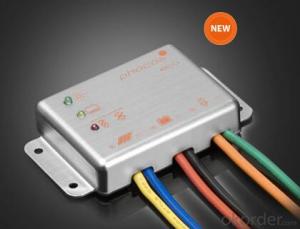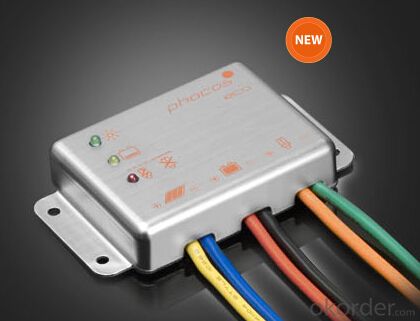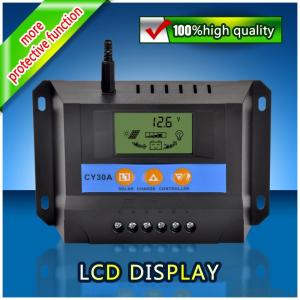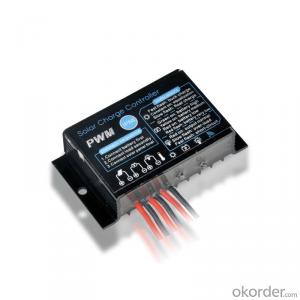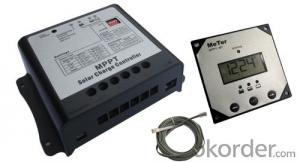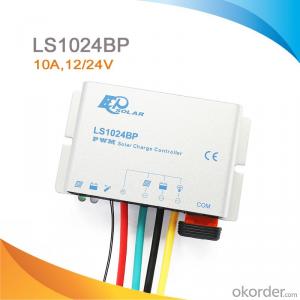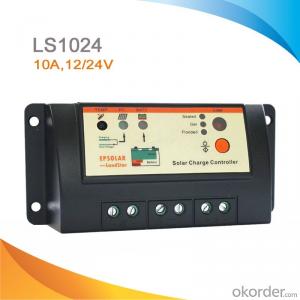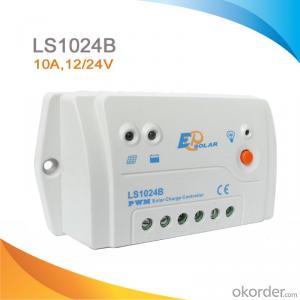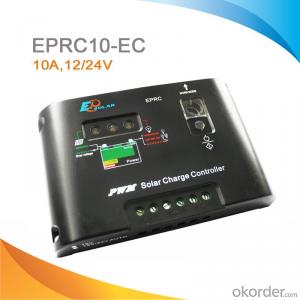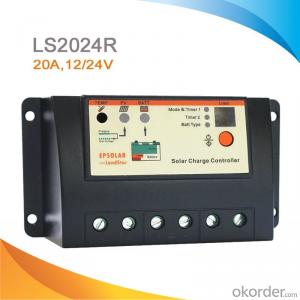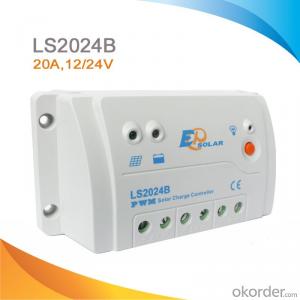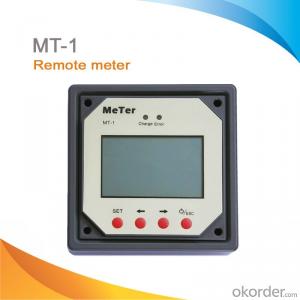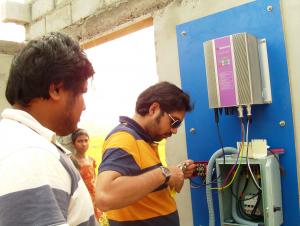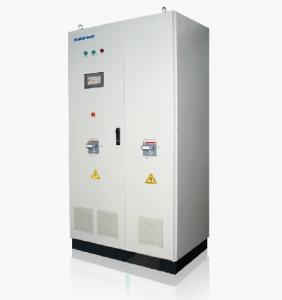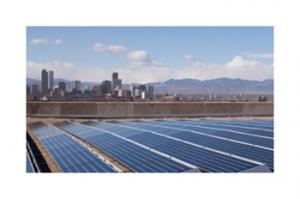Eco (10 A) PWM Solar Charge Controller
- Loading Port:
- China Main Port
- Payment Terms:
- TT OR LC
- Min Order Qty:
- -
- Supply Capability:
- 10000 unit/month
OKorder Service Pledge
OKorder Financial Service
You Might Also Like
· Electronically regulated charging mode: boost, main and float charge
· Deep discharge protection
· PWM series regulation (PV panel is not short-circuited)
· Integrated temperature compensation
· Fully electronically protected against: panel surge voltage, wrong polarity (panel or battery), overload and short circuit at load
· Three LED indications: Charge Status, SOC, LVD, Overload/Short Circuit
· IP68 protection
· The new version of the ECO solar charge controller series is especially designed for small solar systems requiring low-battery disconnect. The ECO series is fully electronically protected. Three LEDs display charging progress,battery SOC and load status (load disconnect).
· Rural electrification systems are the typical applications for this product. It is a perfect solution for cost-sensitive systems.
- Q: Can a solar controller be used with a solar-powered camping setup?
- Yes, a solar controller can definitely be used with a solar-powered camping setup. A solar controller helps regulate the voltage and current from the solar panels to ensure the optimal charging of batteries, which is crucial in a camping setup where reliable power is essential. It protects the batteries from overcharging and prevents any damage to the connected devices. Using a solar controller with a solar-powered camping setup can enhance the efficiency and longevity of the system.
- Q: Can a solar controller be used with a solar-powered composting system?
- Yes, a solar controller can be used with a solar-powered composting system. A solar controller is designed to regulate and optimize the charging and discharging of solar panels, while a solar-powered composting system utilizes solar energy for its operation. By using a solar controller, the system can effectively manage the power generated by the solar panels, ensuring efficient composting processes and reducing dependence on external power sources.
- Q: Can a solar controller be used with solar-powered air quality monitoring stations?
- Solar-powered air quality monitoring stations can benefit greatly from the use of a solar controller. This crucial component is responsible for regulating the flow of electricity from the solar panels to the monitoring station, while also preventing the batteries from becoming overcharged. By connecting the solar panels to the station's power system, the solar controller ensures a consistent supply of clean energy to power the various components, including the sensors and data loggers. As a result, these stations can continuously and sustainably monitor air quality without relying on grid power or frequent battery replacements. For optimal performance and reliable operation, it is highly recommended to incorporate a solar controller into solar-powered air quality monitoring stations.
- Q: Can a solar controller be used in a solar-powered RV system?
- Yes, a solar controller can be used in a solar-powered RV system. A solar controller is essential for regulating the charging and discharging of the batteries in an RV solar system. It helps prevent overcharging, over-discharging, and damage to the batteries, ensuring optimal performance and extending their lifespan.
- Q: Can a solar controller be used with a solar-powered RV or camper?
- Yes, a solar controller can be used with a solar-powered RV or camper. A solar controller regulates the charging process of the batteries in the RV or camper by managing the flow of electricity from the solar panels. It helps prevent overcharging and ensures efficient battery charging, extending their lifespan. Therefore, using a solar controller is essential for optimizing the solar power system in an RV or camper.
- Q: How does a solar controller handle the protection against voltage fluctuations?
- A solar controller handles the protection against voltage fluctuations by monitoring the voltage levels from the solar panels and regulating the flow of electricity to prevent damage to the battery or other connected devices. It ensures that the voltage is maintained within a safe and optimal range by adjusting the charging and discharging rates, thus safeguarding the system against overcharging, overvoltage, and other potential issues caused by voltage fluctuations.
- Q: How do I determine the maximum solar panel input power for a solar controller?
- To determine the maximum solar panel input power for a solar controller, you need to refer to the specifications provided by the manufacturer. The maximum solar panel input power is typically mentioned in the product manual or on the controller itself. It is essential to ensure that the solar panel's power output does not exceed the maximum input power capacity of the solar controller to avoid any potential damage or inefficiency in the system.
- Q: Can a solar controller be used with solar panels that are mounted on a moving vehicle?
- Yes, a solar controller can be used with solar panels that are mounted on a moving vehicle. A solar controller is designed to regulate the charging of batteries from solar panels, regardless of the application or location. When solar panels are mounted on a moving vehicle, the solar controller will still perform its functions effectively. It will monitor the voltage and current coming from the solar panels and adjust the charging process accordingly to ensure the batteries are charged optimally. The solar controller will also protect the batteries from overcharging or discharging, which is crucial for maintaining the longevity and performance of the batteries. Therefore, using a solar controller with solar panels on a moving vehicle is highly recommended to ensure the efficient and safe operation of the solar power system.
- Q: Can a solar controller be used with solar-powered irrigation systems?
- Yes, a solar controller can be used with solar-powered irrigation systems. A solar controller helps regulate and optimize the performance of solar panels, batteries, and pumps in an irrigation system. It ensures proper charging and discharging of batteries, controls water flow, and monitors system performance, making it a crucial component for efficient operation of solar-powered irrigation systems.
- Q: Can a solar controller be used with solar panels that are connected to a battery isolator?
- Solar panels that are connected to a battery isolator can indeed be used with a solar controller. The purpose of a solar controller is to regulate the charging of batteries from solar panels, ensuring efficient and safe charging. Even when solar panels are connected to a battery isolator, the solar controller can still effectively manage the charging process by controlling the flow of solar power to the batteries. The battery isolator serves as a device that permits power to flow from the solar panels to the batteries, while preventing power from flowing back to the solar panels. This setup is commonly employed in off-grid solar systems or situations where multiple battery banks need to be charged simultaneously. By employing a solar controller in conjunction with a battery isolator, the batteries can be effectively charged by the solar panels while safeguarding them against overcharging or damage.
Send your message to us
Eco (10 A) PWM Solar Charge Controller
- Loading Port:
- China Main Port
- Payment Terms:
- TT OR LC
- Min Order Qty:
- -
- Supply Capability:
- 10000 unit/month
OKorder Service Pledge
OKorder Financial Service
Similar products
Hot products
Hot Searches
Related keywords
